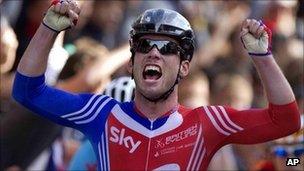Could cycling become the UK's second-favourite sport?
- Published

Mark Cavendish is Britain's first male world road race champion for 46 years
Mark Cavendish's victory in Denmark is the most recent in a series of British cycling triumphs. But how popular can the sport ever become in the UK?
As Mark Cavendish burst across the line in Copenhagen to become world road race champion, he was only the latest in a recent line of illustrious British cyclists to achieve glory.
Two months before, Cavendish claimed the Tour de France green jersey. And at the 2008 Summer Olympics, Great Britain won 14 cycling medals - eight of them gold - topping the cycling medal table and ensuring household name status for the likes of Sir Chris Hoy, Bradley Wiggins and Victoria Pendleton.
Football's position as the UK's favourite sport may appear unassailable.
But this recent spate of success raises the question of whether cycling could overtake the likes of rugby, cricket and tennis to claim the silver medal in the British public's affections.
Levels of interest in the Tour of Britain may not come anywhere near that of the Tour de France. The latter has the world's largest viewing figures for an annual sports event - by contrast, the former attracted 400,000 viewers on average for its stage highlights in 2010.
However, there is clear evidence that the sport's British audience is growing.
A study conducted by UK Sport in the aftermath of the 2008 Games found that support for the nation's cycling team had doubled in the wake of Olympic medal success, with 8.6% of respondents saying this was the event in which they most wanted to see British medal-winners - up from 4.3% before the Games, the largest such increase across all events.
Sky's Ā£30m sponsorship of a British-based professional team, announced in 2009, indicates that a considerable UK market exists.
Likewise, participation in competitive cycling is on the up. British Cycling, the national governing body for the sport, has doubled its membership since 2007 to 40,000.
The organisation says that since 2009 it has increased by 74,500 the number of people cycling once per week and witnessed a 15% rise in non-competitive events organised by its members and clubs.
These figures may not match the likes of football and rugby union, which a 2003 Mori poll suggested 46% and 27% of the public respectively were interested in.
But if cycling is viewed more broadly as an activity, rather than simply as a sport, its reach becomes larger - and is growing.
According to a report by the London School of Economics, the number of cyclists in the UK rose by 11% to 13 million during 2010. In the same year, the market research company Mintel estimated that 34% of adults in the UK owned a bike.
For this reason, Olympic cycling gold medallist Chris Boardman argues that people tend to become interested in elite cycling as a result of taking up the activity themselves, and not the other way round.
"In the last two years, cycling has become trendy," he says.
"Two years ago, if you rode to work you were the geeky, smelly guy. Now it's a small boast."
Victoria Pendleton is one of a growing number of British cycling household names
Boardman argues that road infrastructure for ordinary commuters will need to improve before cycling can truly reach its potential in the UK, and concedes that no other British sport is likely to ever match the levels of investment enjoyed by football in the foreseeable future.
But he does believe that initiatives are succeeding in attracting more ordinary cyclists on to the roads.
"It's a number of things coming together at once," he says. "When we succeed then people enjoy that."
His view is shared by cycling writer Chris Sidwells, author of A Race for Madmen: The Extraordinary History of the Tour de France.
Sidwells notes that the the achievements of Tom Simpson, the UK's most successful post-war road racing cyclist, fuelled huge public interest in the sport at a time when it was barely televised.
Today, he argues, greater levels participation mean there is an even stronger base on which to build.
"I just think we're at the start of a golden age," he says. "People are get into cycling for its own sake and then discover racing. As a sport it's going to get as big as it is a pastime.
"If Bradley Wiggins can win the Tour de France, which I think he can - it's not going to overtake football, but beyond that I think there are no limits."